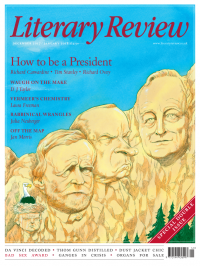Jan Morris
Wiped off the Map
Nowherelands: An Atlas of Vanished Countries 1840-1975
By Bjørn Berge (Translated by Lucy Moffatt)
Thames & Hudson 240pp £16.95
I’m all for eccentric books, and this is certainly one. Translated from Norwegian, it’s an earnest but often entertaining assembly of miscellaneous facts and comments concerning fifty wildly assorted territories across the world, from Sicily to Upper Yafa, which at one time or another since 1840 have ceased to be political entities. While it includes eyewitness accounts, historical interpretations and ruminations on relevant music, films and occasional recipes, it is based fundamentally on the author’s own stamp collection. In creating this, he tells us, he has aimed to include one stamp from every country that has issued stamps since the original Penny Black, and he collects only used examples. He likes to lick the backs of them because he feels it directly associates him with lickers of the past, and every chapter of his book is illustrated with a licked example from his collection (he has also eaten his way through many of the cited recipes, he says, ‘as a way of grounding myself’).
Enriched rather than hampered by such peculiarities, Nowherelands is full of learned and curious interest. I open it at random, for example, at the chapter about Elobey, Annobon and Corisco, population 2,950, area 35 square kilometres, period of existence as an entity 1777–1909. I bet you’ve never heard

Sign Up to our newsletter
Receive free articles, highlights from the archive, news, details of prizes, and much more.@Lit_Review
Follow Literary Review on Twitter
Twitter Feed
Though Jean-Michel Basquiat was a sensation in his lifetime, it was thirty years after his death that one of his pieces fetched a record price of $110.5 million.
Stephen Smith explores the artist's starry afterlife.
Stephen Smith - Paint Fast, Die Young
Stephen Smith: Paint Fast, Die Young - Jean-Michel Basquiat: The Making of an Icon by Doug Woodham
literaryreview.co.uk
15th-century news transmission was a slow business, reliant on horses and ships. As the centuries passed, though, mass newspapers and faster transport sped things up.
John Adamson examines how this evolution changed Europe.
John Adamson - Hold the Front Page
John Adamson: Hold the Front Page - The Great Exchange: Making the News in Early Modern Europe by Joad Raymond Wren
literaryreview.co.uk
"Every page of "Killing the Dead" bursts with fresh insights and deliciously gory details. And, like all the best vampires, it’ll come back to haunt you long after you think you’re done."
✍️My review of John Blair's new book for @Lit_Review
Alexander Lee - Dead Men Walking
Alexander Lee: Dead Men Walking - Killing the Dead: Vampire Epidemics from Mesopotamia to the New World by John Blair
literaryreview.co.uk